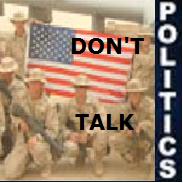 In the fall 2010 edition of the VVAW – The Veteran, I noted something that Mental Health Therapist Johanna Hans Buwalda, one of VVAW’s Military Counselors, wrote that most any Veteran or Military Family who QUESTIONS, let alone OPPOSES the WAR(S), can relate to.
In the fall 2010 edition of the VVAW – The Veteran, I noted something that Mental Health Therapist Johanna Hans Buwalda, one of VVAW’s Military Counselors, wrote that most any Veteran or Military Family who QUESTIONS, let alone OPPOSES the WAR(S), can relate to.
When the VA, or some other government entity, uses  these eight words, “this is not a place to talk politics” the intent is actually meant to suppress dissenting views, or cryptic for “if you don’t have anything nice to say about our government, or the war(s), SHUT UP and don’t say nothing.”
these eight words, “this is not a place to talk politics” the intent is actually meant to suppress dissenting views, or cryptic for “if you don’t have anything nice to say about our government, or the war(s), SHUT UP and don’t say nothing.”
I personally ran into these eight dissent suppressing words as an observer, and military family member, at a PTSD rap session at the Dayton, Ohio VAMC circa 2006 or so. My first and last PTSD rap session simply because these eight words were almost effective in shutting my mouth. Thus, I know first hand where Therapist Johanna Buwalda is coming from. In fact, at that time I cautioned Military Families, Vets, and troops who questioned or opposed the wars on moral grounds to leave their views on the wars outside in the VA parking lot, avoid the VA at all costs, or better yet recruit your own professional Mental Health workers that share your views on the wars.
This would be similar to what Vietnam Veterans began doing when the VA was not fulfilling their needs during the early 1970s, WE created Vet Centers that would eventually become politically acceptable and part of the VA.
I still strongly advise Ray Parish and Johanna Buwalda, the Vet Counselors for Vietnam Veterans Against the War (VVAW), that VVAW, Iraq Veterans Against the War (IVAW), Veterans for Peace (VFP), Veterans for Common Sense (VCS), and Military Families Speak Out (MFSO) to combine resources and effort to create an outreach effort to recruit Psychiatrists, Psychologists, Mental Health technicians and related professionals who share our collective desire to end the wars. Though the drive behind such an outreach program would be Veterans and Military Families, I suggest also tapping into resources from the overall Peace Movement for I believe there is where you will find professional Mental Health folks not associated with the VA willing to volunteer their services. One essential aspect of this would be fund raising ideas shared by all organizations sincerely interested in ensuring our Veterans are taken care of when they come home. With adequate fund raising, as Johanna Buwalda told me, “we would certainly be able to set up an entire mental health system where ‘talking about politics’ could always be welcomed.”
However, Buwalda’s approach of reaching out to the VA is a great first step, but I’m pessimistic that the VA will listen as it is run by whichever partisan political party controls Congress and even more so when they also control the White House.
This does however lay a preliminary legal basis to challenge the VA for discrimination based on political views of a class of Veterans.

I got this legal inspiration from a group of college professors, who happen to be Veterans, working on setting the groundwork at colleges and universities to legally challenge campuses for being Veteran Unfriendly. I almost think this is great except their target is anyone on campus who doesn’t share a positive outlook on war(s). They wish to use these same eight words “this is not a place to talk politics”on college campuses of all places. Now, that’s going to really go over well in Political Science Departments.
What is amazing, and ironic, about the exploitation and use of these eight words, or variations thereof, is that since I first worked for the VA way back in the day (1973 to 1978) everything about the VA was POLITICAL. However, at that time VA management, to include political appointees, was controlled by the mainstream Veterans Service Organizations not political parties (well almost not for most VSOs leaned conservative Republican).
Let’s see what exactly is political about the VA.
First we have the Politics of PTSD, then we have the Politics of Agent Orange, then we have the Politics of Gulf War Illness, then we have the Politics of Burn Pits, then we have the Politics of Depleted Uranium, now we have the “Politics of You Can’t Separate Support for the Troops from Support for the Political Decisions made to go to Wars” – a decision BTW our troops, Veterans, and our families had no part in.
Even within the Tea Party there has been a call to Support the Troops by Ending the War(s)
Johanna Buwalda came up with some interesting solutions to dealing with these eight words intended to suppress our opinions, shut our mouths and blindly go along with anything our government (mostly civilians who have never served in uniform, let alone in combat) desires our troops to do and their families to endure.
Buwalda’s approach is sort of an if I ran the VA or was simply an adviser to those who do, these suggestions would go a long way to improving access and efficient, FAIR, IMPARTIAL and quality use of the VA Health Care system.
I personally endorse everything Johanna had to say, there is going to be an on-going debate in everything from VA education assistance to compensation to health care that will center around polar opposites of which Veterans are being discriminated against, those who support the political decisions to go to war or support the war because they cannot separate support for the wars from support for the troops, versus views of Iraq Veterans Against the War (IVAW), Military Families Speak Out (MFSO), and like minded folks who passionately believe the best way to Support Our Troops is to Bring Them Home Now and Care for their needs as VETERANS.
I believe that when (not if but when) military family members, troops, or Veterans who are intelligent enough to question or oppose the “political” wars, they must make every effort including legal to challenge these eight words “this is not a place to talk politics” where ever we hear them.
As an aside, these eight words are not only used to suppress dissent of Veterans who need access to the VA, don’t talk politics is also intended to silence any dissent of VA employees.
Among Veterans and Military Families who access the VA system, these eight words are used on professional medical staff, medical students, and administrative workers at all levels indoctrinating them to abide by what to think NOT how to think.
The main points Johanna raises that would improve VA performance could almost be the twin of even most conservative Veteran and Military Family groups who passionately believe they cannot separate support for the wars from support for the troops including: Outreach, Checklists and Paperwork, Trust, Anger, [my favorite] Moral injury and PTSD, Military Sexual Trauma (MST) and Women, and Racism.
Robert L. Hanafin, Major, U.S. Air Force-Retired, U.S. Civil Service-Retired, Veterans Issues Editor, VT News Network
VA Health Care Presentation By Johanna (Hans) Buwalda
 A few days ago (time really doesn’t matter), I was sitting on the terrace of a coffee shop in my neighborhood in Chicago writing this presentation, when one of those giant firecrackers went off that sound like a bomb. I jumped. 16 years ago I left the war zone I used to live in, and I still jump. But that is not my point. Two women with two little girls, maybe six years old, were sitting at the table next to mine. So this bomb-firecracker went off and the one woman told the girls: “That is patriotism.”
A few days ago (time really doesn’t matter), I was sitting on the terrace of a coffee shop in my neighborhood in Chicago writing this presentation, when one of those giant firecrackers went off that sound like a bomb. I jumped. 16 years ago I left the war zone I used to live in, and I still jump. But that is not my point. Two women with two little girls, maybe six years old, were sitting at the table next to mine. So this bomb-firecracker went off and the one woman told the girls: “That is patriotism.”
A conversation followed between the four of them that went like this:
First woman: “To show your love for your country, you clean it.” First little girl: “you put trees in it.” Second little girl: “you take care of your garden.” The other woman: “And you stop using so much gasoline.”
It just struck me that there would be no need for this presentation or to have this [Iraq Veterans Against the War (IVAW)] convention all had such conversations with our parents when we were six years old.
I want to acknowledge that there’s many [on] the VA staff that’s competent, motivated and compassionate. There also are many Veterans who get their health care needs met at the VA. Some VA hospitals do a much better job than others.
That said, there are many Veterans who do not get their needs met at the VA, many who won’t even consider going to the VA, many who can’t access the VA for various reasons. As IVAW understands well, this is a problem. After all, the third principle of IVAW is:
Full VA benefits, adequate health care (including mental health) and other supports for returning servicemen and women.
I am a therapist, I don’t work for the VA, but I have had the privilege to work with many Veterans over the past few years. I would like to share a few things that I have learned as a mental health provider about working with Veterans that may be useful for the VA to know as well. Here is what I have seen while working with Veterans who have difficulty getting mental health services at the VA.
Here is a letter to the VA:
Dear VA mental health services:
Outreach
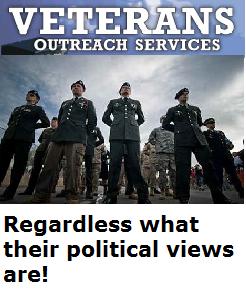 Outreach is key. Waiting for Veterans to come to your office is frequently futile. I know double booking takes care of the problem of filling all appointments, but it doesn’t take care of all Veterans. In fact, you may miss the Veterans who need you most. I know you have established vet-centers, and that is a great step in the right direction, but they are still centers Veterans need to go to. How about leaving your offices and going to meet Veterans where they are at? I mean that quite literally. Go in the shelters, bars, under the bridges, veteran meetings, fundraisers, meet the leadership, listen for who may need help and offer it.
Outreach is key. Waiting for Veterans to come to your office is frequently futile. I know double booking takes care of the problem of filling all appointments, but it doesn’t take care of all Veterans. In fact, you may miss the Veterans who need you most. I know you have established vet-centers, and that is a great step in the right direction, but they are still centers Veterans need to go to. How about leaving your offices and going to meet Veterans where they are at? I mean that quite literally. Go in the shelters, bars, under the bridges, veteran meetings, fundraisers, meet the leadership, listen for who may need help and offer it.
Checklists and Paperwork
 I suggest that you put your checklists and paperwork to the side and listen first. My guess is that checklists and forms are an efficient way to learn about symptoms and that you want ‘outcome measures.’ However, your paperwork is also a very efficient way to turn Veterans off. Checklists will tell you something about symptoms, but checklists will tell you nothing about a veteran’s life, nothing about what Veterans want for their lives and what they believe stands in the way of reaching their goals. Checklists and paperwork will not make a veteran feel truly heard and cared for. Military mental health services seem to operate with the goal of making service personnel ‘combat ready.’ I urge that the VA not operate with a similar goal of just helping Veterans become ‘civilian functional.’ This goes beyond symptoms: Veterans want to thrive.
I suggest that you put your checklists and paperwork to the side and listen first. My guess is that checklists and forms are an efficient way to learn about symptoms and that you want ‘outcome measures.’ However, your paperwork is also a very efficient way to turn Veterans off. Checklists will tell you something about symptoms, but checklists will tell you nothing about a veteran’s life, nothing about what Veterans want for their lives and what they believe stands in the way of reaching their goals. Checklists and paperwork will not make a veteran feel truly heard and cared for. Military mental health services seem to operate with the goal of making service personnel ‘combat ready.’ I urge that the VA not operate with a similar goal of just helping Veterans become ‘civilian functional.’ This goes beyond symptoms: Veterans want to thrive.
Trust
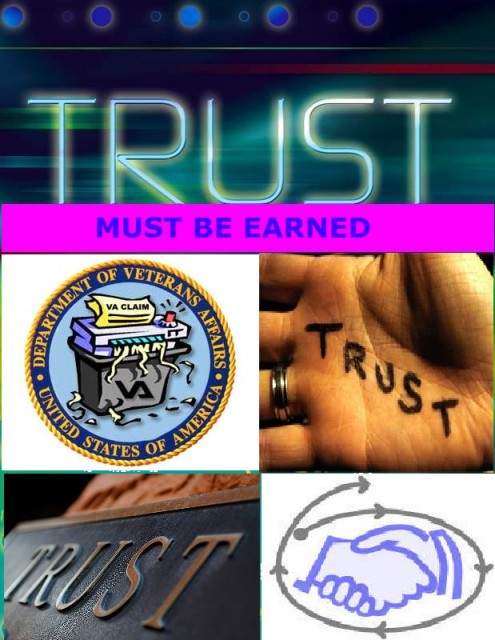 Which brings me to another issue that seems to be understood by only a limited number of VA providers: trust needs to be earned. I don’t envy you! Many of the Veterans I work with see you as part of the same establishment that betrayed them every step of the way. You will have to work very hard, perhaps even harder than me, to earn that trust. I suggest that you take a good look at the providers who are best liked and respected by the Veterans in your hospital. I bet that you will find that these providers treat their patients with respect, kindness and patience. That these providers are welcoming, listen, follow-up, always remember their patients’ names, and often their spouses’ as well. And that they don’t see their patients as non-compliant when they don’t follow doctor’s orders, but that these providers try to find what concerns the veteran has, what happened that the veteran decided or wasn’t able to follow through. They probably always assume that the veteran wants healing. I mean, nobody wishes what some Veterans suffer through every day to their worst enemy!
Which brings me to another issue that seems to be understood by only a limited number of VA providers: trust needs to be earned. I don’t envy you! Many of the Veterans I work with see you as part of the same establishment that betrayed them every step of the way. You will have to work very hard, perhaps even harder than me, to earn that trust. I suggest that you take a good look at the providers who are best liked and respected by the Veterans in your hospital. I bet that you will find that these providers treat their patients with respect, kindness and patience. That these providers are welcoming, listen, follow-up, always remember their patients’ names, and often their spouses’ as well. And that they don’t see their patients as non-compliant when they don’t follow doctor’s orders, but that these providers try to find what concerns the veteran has, what happened that the veteran decided or wasn’t able to follow through. They probably always assume that the veteran wants healing. I mean, nobody wishes what some Veterans suffer through every day to their worst enemy!
I can assure you, VA health care that I try to practice all of these things. I have never felt used or abused by a veteran, not even those that you sometimes seem to be so afraid of, the veteran with addiction problems. My phone is always on. No veteran has ever called me at three in the morning for some frivolous reason. Please, VA, get rid of the idea that Veterans are out to cheat the system. Maybe some are, but in my experience the vast majority are not. Even if they are, remember that they were betrayed many times over. They served in our name and are going to be affected all their lives; they have the right to be cared for and receive the best care possible.
Anger
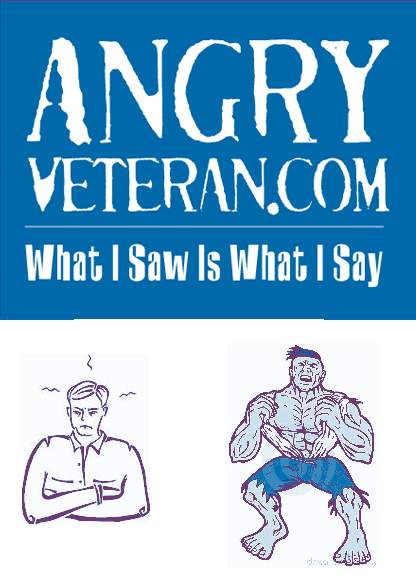 Many of you seem to be more afraid of anger than seems reasonable to me. I understand that you need to keep yourself safe, and I know that some Veterans are afraid of their own anger because they know what they are capable of doing.
Many of you seem to be more afraid of anger than seems reasonable to me. I understand that you need to keep yourself safe, and I know that some Veterans are afraid of their own anger because they know what they are capable of doing.
But maybe you need to understand that anger is much more than a symptom of PTSD, that Veterans have very good reasons to be angry. Some of them feel cheated or dumb or gullible because they bought into what the recruiters promised, what they learned as children (the US is the greatest country; serving in the military is an honor, etc). They are angry about being forced to fight in an unjust war, angry about trusting a leadership that turned out not to be trust worthy. Angry about not being taken care of when returning, about civilians not being particularly aware that a war has been going on, about not getting welcomed home after deployment, about being betrayed over and over again.
And I am sure that you know that Veterans were trained to not express their sadness, frustration, anxiety, grief, unhappiness and other emotional pain. Only anger was useful in combat.
VT Editorial Comment: Angry about civilian not being particularly aware that a war has been going on (public apathy) is most likely anger shared by most Iraq and Afghanistan Veterans regardless what their political views on the wars are. However, I personally believe that there are adequate efforts made by a minority of other Veterans and Military Family groups to Welcome Home younger Veterans of these wars due to the Vietnam Syndrome. We don’t want this generation of Vets treated like we Vietnam Vets were treated is a theme that almost crosses political ideological lines. I’d have to say that those Vets and Families that obviously Support the Wars receive a friendlier welcome home than those Vets and Families who question or oppose the wars.
Johanna continues, “Believe me, I don’t like anger very much either, but I know the veteran dealing with it likes it even less. In my experience, the anger is seldom if ever about me or even directed at me, and is almost always something that a veteran wants to talk about resolving. You have to handle anger and you have to learn not to get caught up in it. Also do not deny Veterans services because they expressed their feelings with anger. They may actually need you the most during that time.”
Moral injury
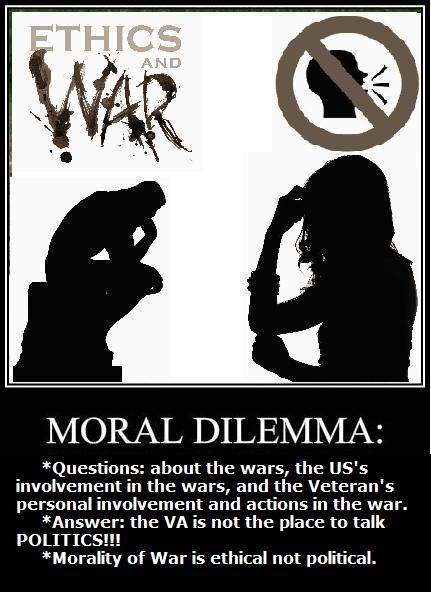 Some Veterans have told me that when they tried to talk about their moral questions about the war, the US’s involvement in the war, and their personal involvement and actions in the war, they are being told that the VA is not a place to talk politics.
Some Veterans have told me that when they tried to talk about their moral questions about the war, the US’s involvement in the war, and their personal involvement and actions in the war, they are being told that the VA is not a place to talk politics.
However, how can providers consider treating Veterans without talking about the moral questions that Veterans ask themselves every day? The questions that make it so hard to get up and face themselves? Am I still a good person, Will I still be loved if my family would know what I did out there? Will they be afraid of me if they knew what goes on in my mind when I am angry?
These are very hard to talk about, and very hard to listen to as a mental health provider as well. But these questions are at the heart of healing.
We are not dealing with internal issues only, as a provider we have to be willing to look at the larger social- political issues surrounding the Veterans’ life.
If you cannot hear those stories, you cannot work with Veterans as a mental health provider. I suggest though, that you practice very good and comprehensive self-care.
VT Editorial Comment: Although Johanna mentions it below, the politically correct triggers of PTSD are not moral injuries by nature. However, seeing dead bodies, losing buddies, and/or killing people, has become gender non-specific with men and women not only facing these issues but the moral injuries mentioned here.
Military Sexual Trauma (MST) and Women
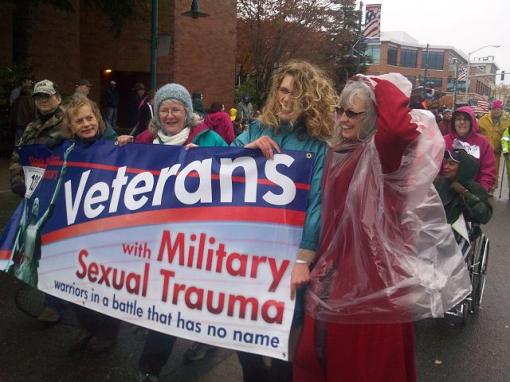 Johanna continues, “I want to say something about MST and women. I am so glad that some of you have realized how intimidating your VA medical centers can be for women. Just entering one of your hospitals can bring up a slew of memories of being a woman in a sea of males. Maybe my point here has more to do about outreach than MST and women. I let women choose where they want to meet because I want them to feel as safe as possible. Even though my office is in a very small wellness center, the women seldom choose to meet there. Even if you have separate women’s clinics (and I applaud you for that), she still has to go to the pharmacy for example.
Johanna continues, “I want to say something about MST and women. I am so glad that some of you have realized how intimidating your VA medical centers can be for women. Just entering one of your hospitals can bring up a slew of memories of being a woman in a sea of males. Maybe my point here has more to do about outreach than MST and women. I let women choose where they want to meet because I want them to feel as safe as possible. Even though my office is in a very small wellness center, the women seldom choose to meet there. Even if you have separate women’s clinics (and I applaud you for that), she still has to go to the pharmacy for example.
In my experience, 100% of women have some level of MST ranging from feeling unsafe to rape. But please don’t forget that while women are still not supposed to be in combat positions, they are. Seeing dead bodies, losing buddies, and/or killing people, has become gender non-specific. Please remember to deal with combat related issues. In women Veterans, PTSD is not limited to MST.
On the other hand, please also remember that in male Veterans, PTSD is not limited to combat. In my experience, 10% of male Veterans have experienced some level of MST.
Racism
 I have noticed that Veterans of color who have used the VA have not discussed their experience with racism. Maybe this is not across the board and just limited to the Veterans I have met. I hope so. But just in case it is not, I want you to know that when I meet with Veterans of color, racism almost always becomes a topic of conversation. When discussing stressors and trauma while serving in the military and/or while deployed, experience with racism almost always turns out to have a major impact on the mental health of that veteran.
I have noticed that Veterans of color who have used the VA have not discussed their experience with racism. Maybe this is not across the board and just limited to the Veterans I have met. I hope so. But just in case it is not, I want you to know that when I meet with Veterans of color, racism almost always becomes a topic of conversation. When discussing stressors and trauma while serving in the military and/or while deployed, experience with racism almost always turns out to have a major impact on the mental health of that veteran.
Dear VA providers, some of you are going to say that I care too much or that I don’t know how to keep appropriate boundaries. I don’t agree with you. I believe that we should all care, we can’t care enough. This country sent these, often very young, men and women out into grave danger in our name, for our sake. We have more than an obligation to care for them. They didn’t go home at 5 o’clock thinking that the nation could wait being safe till tomorrow. They still can’t go home at 5 o’clock free of suffering the aftermath of war.
If the VA doesn’t have enough people to provide that level of care, they need to get more. It all boils down again to the fact that we have an obligation to those we sent out to defend us, regardless of how misguided these wars may be.
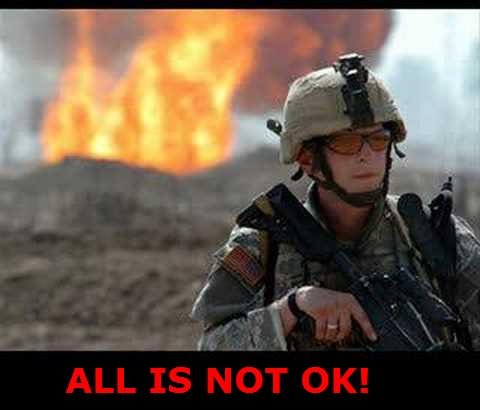 A couple of days ago, a veteran posted a video entitled “All is Not Okay (music by Seether).” The video was powerful, but it was actually a comment below the video that caught my eye. It said:
A couple of days ago, a veteran posted a video entitled “All is Not Okay (music by Seether).” The video was powerful, but it was actually a comment below the video that caught my eye. It said:
“Douglas Barber, an Iraq vet tried to get help from the VA for two years after his return from the… quagmire.” That comment just struck me as being at the heart of the issue. Douglas Barber should not have needed to try the get help from the VA for two years. To me, it should have been the other way around. The VA should have tried to help Douglas Barber for two years or for as long as it took to support him. I mean, VA, is Veterans Administration, not Administration Veterans. If the VA, would truly be able to put Veterans before Administration maybe Veterans like Douglas Barber would still be alive. Instead, Douglas Barber committed suicide.
Thank you for listening to me. Please feel free to contact me with any questions and/or concerns.
This is the text of Johanna Buwalda’s presentation at the Iraq Veterans Against the War (IVAW) Convention – Panel on VA Health Care, July 9, 2010 in Austin, Texas.
Hans Buwalda is one of VVAW’s Military Counselors.
VETERANS TODAY CLOSING COMMENT:
There are those who sincerely believe that WE cannot separate Support for Our Troops from Support for Their Wars. WE will see efforts launched and even some already in progress to assert that IF WE do not Support Our Troops and Their Wars then WE are DISCRIMINATING against Veterans.
You Can Support Our Troops AND Support Their War BUT
You Cannot Support Their War AND NOT Support Our Troops.
You Cannot Support Our Troops AND NOT Support Their War.
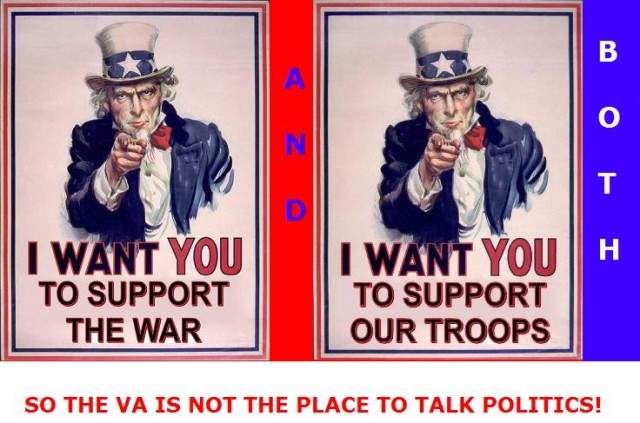
With the Right-Wing back in power, rest assured that these eight words will get plenty of use to SUPPRESS DISSENT!!!
ROBERT L. HANAFIN, Major, U.S. Air Force-Retired, U.S. Civil Service-Retired, Veterans Issues Editor, VT News
Readers are more than welcome to use the articles I’ve posted on Veterans Today, I’ve had to take a break from VT as Veterans Issues and Peace Activism Editor and staff writer due to personal medical reasons in our military family that take away too much time needed to properly express future stories or respond to readers in a timely manner.
My association with VT since its founding in 2004 has been a very rewarding experience for me.
Retired from both the Air Force and Civil Service. Went in the regular Army at 17 during Vietnam (1968), stayed in the Army Reserve to complete my eight year commitment in 1976. Served in Air Defense Artillery, and a Mechanized Infantry Division (4MID) at Fort Carson, Co. Used the GI Bill to go to college, worked full time at the VA, and non-scholarship Air Force 2-Year ROTC program for prior service military. Commissioned in the Air Force in 1977. Served as a Military Intelligence Officer from 1977 to 1994. Upon retirement I entered retail drugstore management training with Safeway Drugs Stores in California. Retail Sales Management was not my cup of tea, so I applied my former U.S. Civil Service status with the VA to get my foot in the door at the Justice Department, and later Department of the Navy retiring with disability from the Civil Service in 2000.
I’ve been with Veterans Today since the site originated. I’m now on the Editorial Board. I was also on the Editorial Board of Our Troops News Ladder another progressive leaning Veterans and Military Family news clearing house.
I remain married for over 45 years. I am both a Vietnam Era and Gulf War Veteran. I served on Okinawa and Fort Carson, Colorado during Vietnam and in the Office of the Air Force Inspector General at Norton AFB, CA during Desert Storm. I retired from the Air Force in 1994 having worked on the Air Staff and Defense Intelligence Agency at the Pentagon.
ATTENTION READERS
We See The World From All Sides and Want YOU To Be Fully InformedIn fact, intentional disinformation is a disgraceful scourge in media today. So to assuage any possible errant incorrect information posted herein, we strongly encourage you to seek corroboration from other non-VT sources before forming an educated opinion.
About VT - Policies & Disclosures - Comment Policy



